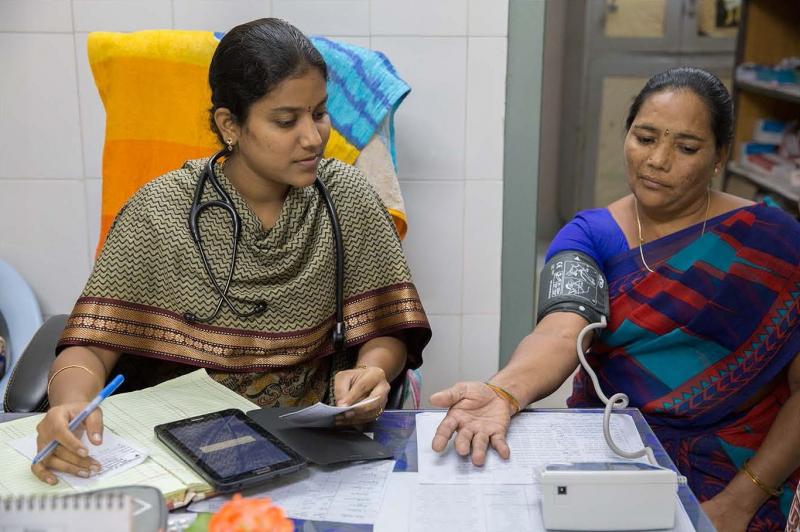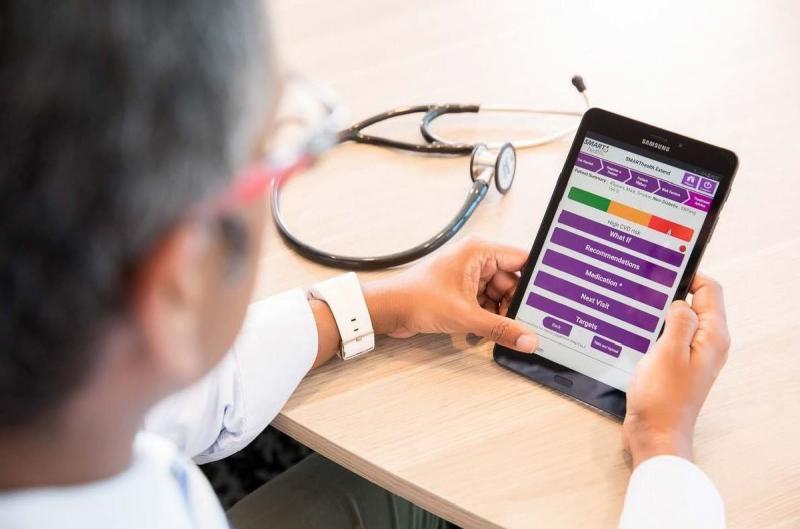The George Institute for Global Health has developed the SMARThealth system, a low cost digital platform that supports clinical decision-making and improves the screening, detection and management of adults with chronic diseases. It uses guideline and evidence-based algorithms developed over 15 years of research and development and can be adapted for low and middle income countries.
NHMRC supported the development of the SMARThealth program through a range of Development, Project, Partnership and Global Alliance for Chronic Diseases (GACD) Grants, since 2009.
A landscape format version of this case study is available as a PDF from the Downloads section below.
Origin
A large body of evidence has shown that electronic-based decision support systems, especially in primary health care settings, can lead to better quality care. TGI developed its first SMARThealth platform—HealthTracker—in 2011. It was an important innovation that provided clinical decision support tools for cardiovascular disease management and prevention in primary health care services. Integrated with electronic medical records, it was designed to help health professionals implement recommendations from clinical guidelines and make it easier for patients to understand their risks.
Following the successful development and trial of HealthTracker, the SMARThealth concept was extended to a tablet-based system that could be utilised in low resource settings.
Over the last few years, TGI has further developed the SMARThealth system to support the detection and ongoing management of high-risk non-communicable diseases and related risk factors that can be adapted to work in any global setting.
The SMARThealth platform is cloud-based and can be adapted for each local context. In well-resourced settings, it provides guideline- and evidence-based decision support to physicians to improve the proportion of patients receiving optimal care.
Grants and Investment
NHMRC
NHMRC has supported the development of the SMARThealth program through a range of Development, Project, Partnership and Global Alliance for Chronic Diseases (GACD) Grants, from 2009 to the present. It has also supported individual fellowships as follows:
Professor David Peiris:
- NHMRC Early Career Fellowship, 2013
- NHMRC Career Development Fellowship, 2018
Professor Anushka Patel:
- NHMRC Senior Research Fellowship, 2010 and 2015
- NHMRC Principal Research Fellowship, 2018.
Other grants and investment
- 2011: New South Wales (NSW) Health: Living Well - an Aboriginal Health Chronic Care Initiative
- 2012: The Hospitals Contribution Fund of Australia (HCF) Health and Medical Research Foundation Research Grant
- 2014: The Royal Australian College of General Practitioners (RACGP)/Therapeutic Guidelines Ltd Research Gran
- 2014: Grand Challenges Canada: Stars in Global Health program (Associate Professor (A/Prof) Pallab K. Maulik)
- 2014: The Wellcome Trust/Department of Biotechnology (DBT) India Alliance’s Intermediate Fellowship (A/Prof Maulik)
- 2016: Give2Asia Grant
- 2018: Medical Research Council (UK): Newton Fund Grant.
Commercialisation Journey
George Health Enterprises is the commercial arm of TGI, which has a goal of driving impact and generating financial returns to be invested back into the Institute. It has launched a commercial solution of SMARThealth with private partners and governments across Australia, China and India.
In India, a chronic disease management organisation uses SMARThealth as part of its telephone coaching service to patients with diabetes or pre-diabetes, allowing them to self-assess their risk levels and receive personalised recommendations on next steps. Telephone coaches use a provider dashboard to reinforce with patients the need for further risk factor assessment or attendance at a doctor. In China, a home care provider uses the tool to ensure its customers receive guideline-based care for cardiovascular disease and diabetes and to refer high-risk patients for medical review if required. In Australia, the tool is enabling population screening for chronic diseases amongst high-risk groups using a public health information website.
All of these partnerships have involved adapting the platform to integrate into existing health systems and workflows. SMARThealth addresses multiple points of the care cycle to improve management of chronic disease. TGI’s goal is to grow SMARThealth to reach 3.8 million people in both Australia and low- and middle-income countries (LMICs) within three years. Financial returns from this program will be reinvested in the TGI SMARThealth research program.
Research and Trials
The SMARThealth program has completed four significant trials:
- CVD management, 2012: Conducted in Aboriginal Community Controlled Health Services and mainstream general practices in Australia. Results of the trial showed a 10% improvement in the measured CVD risk factors.
- CVD management, 2012-16: Conducted in Andhra Pradesh, India. Uptake of the program was high in the community; however improved blood pressure control was not seen because of a range of local context and design factors.
- Common mental health disorders (CMD), 2014-16: Conducted in Andhra Pradesh, India. This pilot study trained lay village health workers and primary care doctors to screen, diagnose and manage individuals with CMD using an electronic decision support system. Around 5% of participants were identified as having a significant CMD. Previously, fewer than 1% of these individuals had used mental health services; after the intervention, this increased to almost 13%.
- Extend trial for CVD, 2017-18: Conducted in East Java, Indonesia. Frontline health workers screened approximately 11,000 individuals. Results are currently under review for publication. Funding has been secured to conduct a ‘proof of concept’ scale-up trial in 100 villages.
A number of new trials on modules for diabetes (India, China and Thailand) and pregnancy (India) are currently underway.
Outcomes and Impact
In high-income settings, only around 50% of people with elevated blood pressure have their condition adequately managed. In many LMICs the figure is under 10%. This equates to millions of people’s lives affected yearly by preventable disease. The SMARThealth program is building capacity to assist over 3 million of these people by 2022.
The SMARThealth community-based screening and treatment programs in Aboriginal and Torres Strait Islander populations, India and Indonesia have shown positive results in increasing the capacity to screen large populations, identifying those at highest risk and improving treatment rates for highly prevalent chronic diseases.
Current and future work is now focused on expanding the disease areas that are addressed within the SMARThealth program (including a new module targeting women with high risk pregnancies in rural India) as well as identifying relevant business models to implement the SMARThealth program at scale within health systems of LMICs.

Mobile technology helps health workers in low resource settings to identify patients at high risk, refer them to a physician when required and provide active follow-up for patients and community engagement.
SMARThealth timeline
| Date | Event |
|---|---|
| 2009 | NHMRC Development Grant |
| 2010 | NHMRC Fellowship (Patel) |
| 2011 | NHMRC Project Grant |
| 2011 | NSW Health Grant |
| 2012 | NHMRC Partnership Grant; NHMRC GACD Grant (SMARThealth trial in India) |
| 2012 | HCF Grant |
| 2012 | SMARThealth trial in NSW and QLD |
| 2013 | NHMRC Fellowship (Peiris) |
| 2014 | Grand Challenges Canada Grant |
| 2014 | Wellcome Trust/DBT India Alliance Fellowship (Maulik) |
| 2014 | RACGP Grant |
| 2015 | NHMRC Project Grant |
| 2015 | NHMRC Fellowship (Patel) |
| 2015 | NHMRC GACD Grant (SMART Diabetes trial in China) |
| 2016 | Give2Asia Grant |
| 2018 | SMARThealth Diabetes trial in Thailand; SMARThealth Pregnancy project in India |
| 2018 | NHMRC GACD Grant (SMART Mental Health trial in India) |
| 2018 | NHMRC Fellowship (Peiris); NHMRC Fellowship (Patel) |
Researcher Profiles
Professor Anushka Patel
Professor Patel is Chief Scientist at TGI, Professor of Medicine at the University of NSW (UNSW) Sydney, a cardiologist at Royal Prince Alfred Hospital in Sydney and an NHMRC Principal Research Fellow. She studied medicine at the University of Queensland, with postgraduate degrees from Harvard University and the University of Sydney. As Chief Scientist, she has a key role in developing global strategic initiatives across TGI. Her personal research interests focus on innovative solutions for delivering affordable and effective cardiovascular care in the community and in acute care hospital settings. Professor Patel currently leads research projects in a number of countries including Australia, China and Indonesia.
Professor David Peiris
Professor Peiris is Director of Health Systems Science at TGI, a Professor in Medicine at UNSW Sydney, a practising General Practitioner and an NHMRC Career Development Fellow. He was the 2015-2016 Australian Harkness Fellow in Healthcare Policy based at the Harvard School of Public Health. He has been a board member with the Royal Australian College of General Practitioners National Faculty of Aboriginal and Torres Strait Islander Health and sits on several advisory committees. Professor Peiris is passionate about making high quality primary health care accessible to under-served populations worldwide.
Associate Professor Puhong Zhang
A/Prof Zhang is Associate Director at TGI China, and A/Prof of Epidemiology, Faculty of Medicine, UNSW Sydney. He joined TGI’s China office in 2011 and is now in charge of the Diabetes, Women's & Child Health and Nutrition & Lifestyle programs. A/Prof Zhang gained his doctoral degree in Epidemiology and Statistics in 2004. Since joining TGI, he has been responsible for 11 projects as Principal Investigator (PI) or Co-PI, with grants totalling AU$26 million ($25 million covering the past three years). Diabetes, nutrition and mobile health innovation are his current major research areas.
Dr Devarsetty Praveen
Dr Praveen is the Program Head of Primary Health Care at TGI India, and a senior lecturer in Medicine at UNSW Sydney. He also leads the Global SMARThealth Program at TGI. Dr Praveen is a public health specialist with thorough knowledge of epidemiological study designs, and a keen interest in systems-based innovations to address inequities related to chronic diseases. His research experience is in planning and managing large-scale public health research projects and surveys in India and other low- and middle-income countries. Dr Praveen’s current focus is on health systems and barriers to improving health service delivery.
Associate Professor Pallab K. Maulik
A/Prof Maulik is the Director of Research at TGI India, and A/Prof in Medicine at UNSW Sydney. He studied psychiatry at All India Institute of Medical Sciences, New Delhi, public health at the London School of Hygiene and Tropical Medicine, and completed his Masters and doctoral training at Johns Hopkins School of Public Health. A/Prof Maulik has worked with the World Health Organisation’s mental health programs and clinically as a psychiatrist in India and Australia. His research interests include social determinants of health, mental health disorders and intellectual disability. A/Prof Maulik is a Wellcome Trust/DBT India Alliance Intermediate Fellow and is leading the SMART Mental Health program.
